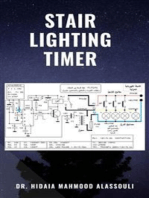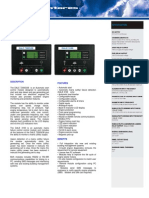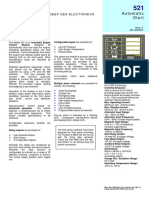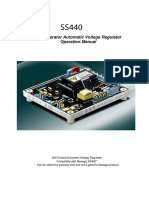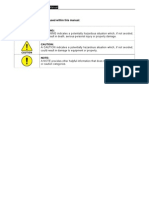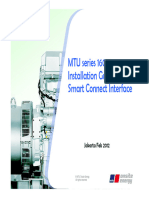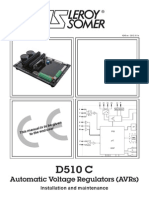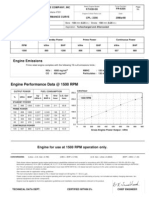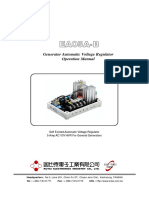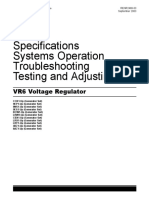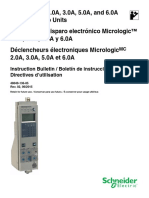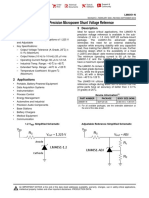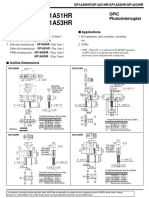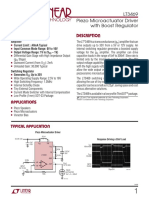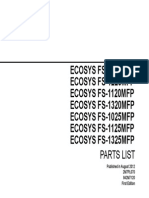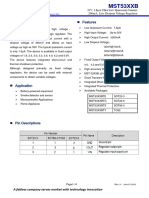0 ratings0% found this document useful (0 votes)
103 viewsADVR-12: Hybrid Universal Analog Digital Voltage Regulator Operation Manual
ADVR-12: Hybrid Universal Analog Digital Voltage Regulator Operation Manual
Uploaded by
carmeniyoThis document provides an operation manual for the ADVR-12 hybrid universal analog-digital voltage regulator. The ADVR-12 is a 12 amp regulator compatible with many common regulators. It features voltage sensing without potential transformers up to 520 volts and new DIP and TRIM adjustments compatible with automatic paralleling and power factor controllers. The manual provides specifications, installation guidelines, adjustment procedures, connection terminal explanations, and wiring instructions for the ADVR-12 regulator.
Copyright:
© All Rights Reserved
Available Formats
Download as PDF, TXT or read online from Scribd
ADVR-12: Hybrid Universal Analog Digital Voltage Regulator Operation Manual
ADVR-12: Hybrid Universal Analog Digital Voltage Regulator Operation Manual
Uploaded by
carmeniyo0 ratings0% found this document useful (0 votes)
103 views10 pagesThis document provides an operation manual for the ADVR-12 hybrid universal analog-digital voltage regulator. The ADVR-12 is a 12 amp regulator compatible with many common regulators. It features voltage sensing without potential transformers up to 520 volts and new DIP and TRIM adjustments compatible with automatic paralleling and power factor controllers. The manual provides specifications, installation guidelines, adjustment procedures, connection terminal explanations, and wiring instructions for the ADVR-12 regulator.
Original Title
Advr 12 Manual
Copyright
© © All Rights Reserved
Available Formats
PDF, TXT or read online from Scribd
Share this document
Did you find this document useful?
Is this content inappropriate?
This document provides an operation manual for the ADVR-12 hybrid universal analog-digital voltage regulator. The ADVR-12 is a 12 amp regulator compatible with many common regulators. It features voltage sensing without potential transformers up to 520 volts and new DIP and TRIM adjustments compatible with automatic paralleling and power factor controllers. The manual provides specifications, installation guidelines, adjustment procedures, connection terminal explanations, and wiring instructions for the ADVR-12 regulator.
Copyright:
© All Rights Reserved
Available Formats
Download as PDF, TXT or read online from Scribd
Download as pdf or txt
0 ratings0% found this document useful (0 votes)
103 views10 pagesADVR-12: Hybrid Universal Analog Digital Voltage Regulator Operation Manual
ADVR-12: Hybrid Universal Analog Digital Voltage Regulator Operation Manual
Uploaded by
carmeniyoThis document provides an operation manual for the ADVR-12 hybrid universal analog-digital voltage regulator. The ADVR-12 is a 12 amp regulator compatible with many common regulators. It features voltage sensing without potential transformers up to 520 volts and new DIP and TRIM adjustments compatible with automatic paralleling and power factor controllers. The manual provides specifications, installation guidelines, adjustment procedures, connection terminal explanations, and wiring instructions for the ADVR-12 regulator.
Copyright:
© All Rights Reserved
Available Formats
Download as PDF, TXT or read online from Scribd
Download as pdf or txt
You are on page 1of 10
ADVR-
Hybrid Universal Analog
Digital Voltage Regulator
Operation Manual
Self Excited Automatic Voltage Regulator
For use in Brushless PMG and Auxiliary Winding
4501 NW 27 Ave
Miami Florida 33142
305.634.1511
______________________________________________________________________________________
2 ADVR-12
1. SUMMARY
The ADVR-12 is a totally new hybrid 12 Amp
universal voltage regulator with a comparable
footprint as the Basler* AVC63-12 and AVC125-10,
CAT* VR6, KATO* K65-12B and K125-10B, and the
Leroy Somer* 202-8634, and many other. To
simplify installation, voltage sensing without PTs up
to 520 volts was added, also new DIP & TRIM
adjustment compatible with many automatic
paralleling and PF controllers in the market. The
new CPU design makes the ADVR-12 exceedingly
stable, however keeping the analog power circuit for
fast response.
2. SPECIFICATION
Sensing Input 1
Voltage 220 / 440VAC 50 / 60Hz
(SW5 Selectable)
180 ~ 260VAC @ 220VAC
330 ~ 520VAC @ 440VAC
Power Input 1 or 3
Voltage 100 ~ 300VAC, 40 ~ 500Hz
Output 63VDC @ 110VAC input
125VDC @ 220VAC input
Output
Current Continuous 12ADC
Maximum 25ADC for 10 sec
Frequency
50 / 60Hz (SW4 Selectable)
40 ~ 51Hz @ 50Hz Preset 47Hz
50 ~ 61Hz @ 60Hz Preset 57Hz
Voltage Regulation
< 0.5% ( with 4% engine governing )
Voltage Build-up
Residual voltage at AVR terminal > 6 VAC @ 25Hz
Thermal Drift
0.03% per
C change in AVR ambient
Over Excitation Protection
60% of Input Voltage
External Volts Adjustment VR
10K ohm 0.5 watt trimmer
Excitation Resistance
> 10 ohm
Current Compensation
1 or 5A > 0.2VA
Max 7% @ P.F 0.5
Analogue Voltage Input
Un0 ~ 10% @ 5VDC <2mA
Respond Time
< 1 Cycle
Unit Power Dissipation
Max. 12 watt
Dimensions
214mm L * 163mm W * 45.7mm H
Weight
1130g 2%
ATTENTION
1. AVR can be mounted directly on the engine,
genset, switchgear, control panel, or any position
that will not affects operation. For dimension
reference, please see Figure 1.
2. All voltage readings are to be taken with an
average-reading voltmeter Meggers and
high-potential test equipment must not be used.
Use of such equipment could damage the AVR.
3. Secure all wiring connection. Do not install AVR at a
place with high vibrations to prevent loose
connections. For safety do not touch the heat sink
while in operation.
4. Fuse specification12A / 250V slow blow type.
Outline and Drilling Diagram
Figure 1
UNITS : mm
______________________________________________________________________________________
ADVR-12 3
3. DIP SWITCH ADJUSTMENT (SW)
KW
SW
<90KW 90~500KW >500KW
1 OFF ON ON
2 OFF OFF ON
SW ON OFF
3 O/E Deactivated O/E Activated
4 50Hz 60Hz
5 440V 220V
ATTENTION
When 60Hz frequency setting is selected on a
50Hz generator, it could result in under voltage.
When 50Hz frequency setting in selected on a
60Hz generator, it could result in over excitation
current when stopping the generator and cause
sever damage to the generator or AVR.
After adjusting SW1 or 2, the STAB must be
recalibrated to ensure maximum performance.
All adjustment of SW must be conducted when
engine is not in operation.
4. ADJUSTMENT
4.1 VOLT
Voltage setting adjusting the genset rated output
voltage.
When SW5 is OFF (220V) adjustable range is
175 ~ 260VAC.
When SW1 is ON (440V) adjustable range is
350 ~ 520VAC.
When terminal 7 & 4 are bridged together,
voltage adjustment is on the AVR VOLT VR.
When connect a 10k ohm external VR to terminal
7 & 6a the voltage adjustment can be adjusted
remotely (When terminal 7 & 4 is open circuit the
AVR VOLT VR is ineffective.
ATTENTION
AVR AC voltage readings are all average value.
4.2 STAB
Adjust STAB fully clockwise, the generator voltage
will begin to fluctuate, whereas if adjust fully
counterclockwise the voltage becomes stable.
The correct stability setting is at a knee point,
where the voltage is stable yet on the brink of
becoming unstable.
If Stability is over adjusted, it can result in high
voltage fluctuation when load is connected.
4.3 U/F
Under frequency protection adjustment. When
generator frequency falls below the knee point, the
under frequency protection circuit will begin to
intervene and voltage and frequency begin to
decrease in linear descend. Coordinate with the DIP
switch SW4 frequency selection 50/60Hz.
When selecting 50Hz the adjustable range is from
40 to 51Hz and the factory presets at 47Hz.
When selecting 60Hz the adjustable range is from
50 to 61Hz and the factory presets at 57Hz.
4.4 U/F LED
When under frequency protection is activated, the
RED LED will light up.
4.5 DIP
When under frequency protection is activated, the
voltage droop ratio is adjusted via the DIP VR. The
adjustable range is 3 ~ 10 V/Hz.
4.6 DROOP
Droop adjustment. When paralleling, the AVR
compensate the input rating and voltage shifting
basis on load current, through internal circuit
calculation and increase or decrease the voltage.
When phase current lag the voltage, it decreases
original voltage setting and if the phase current lead
the voltage then it increases the original voltage
setting. The increase and decrease range can be
preset by the DROOP adjustment.
4.7 TRIM
Analogue voltage Input sensitivity. When terminal 2
and 3 is added with a DC input (0 ~ 5V), the TRIM
is used to adjust the influence level from the DC
input to the rated voltage. If the TRIM potential (POT)
is adjusted fully counter-clockwise, and then the
additional signal will not cause any influence. On the
contrary if the TRIM is adjusted fully clockwise, then
the additional signal will produce a maximum effect.
4.8 O/E
The protection is enabled by selecting DIP SW 3 to
OFF position (Protection disabled when DIP SW 3
select to ON). The O/E voltage setting is at 125VDC
5V. If generator excitation voltage exceeds the
setting the AVR will shutdown the excitation output
and illuminate the O/E LED. To reset the protection,
stop generator for 30 seconds before restart. The
higher the excitation voltage the faster the AVR
enables the protection from 0.1 ~ 20 seconds.
If O/E is disabled, (DIP SW 3 to OFF position) the
AVR does not shutdown the generator excitation
output but only illuminate the O/E LED.
______________________________________________________________________________________
4 ADVR-12
5. CONNECTION TERMINAL
PIN NO. NOTES
CH GND Ground
2
Analogue voltage input
3
4
For onboard voltage adjustment 4 & 7
Shorted
For external voltage adjustment (Connect
10K ohm VR to 6a & 7) 4 & 7 Open
5 CT (Current Transformer) 1A input
5a CT (Current Transformer) 5A input
6 CT (Current Transformer) common
6a Bridge selection common
7
For onboard voltage adjustment 4 & 7
Shorted
For external voltage adjustment (Connect
10K ohm VR to 6a & 7) 4 & 7 Open
8 Null
9 9 & 6a Open for single phase sensing
20 R phase sensing input
22 S phase sensing input
26 3 power input
28 1 or 3 power input
30 1 or 3 power input
F1 Positive + excitation output
F2 Negative excitation output
5.1 Manual excitation / Flash (None PMG
system)
A newly assembled generator, a exciter with
incorrect polarity or with field residual voltage less
than 6VAC, please disconnect the AVR wiring
connection with engine at rest and follow the steps
below :
Series a limiting resistor at F1 (Positive) & F2
(Negative) and apply a DC input (Do not exceed
24VDC). The resistance is 1ohm per volt with 1
watt per volt at power.
For example : If the DC input is 24VDC with
24ohm the resistor should be 24 watt.
Remove DC power input from exciter after 5
seconds.
Reconnect wiring.
Start up engine, and if the measured residual
voltage is still below 6Vac, repeat step 1 and 2.
5.2 Under frequency protection Knee point
setting
50Hz adjustable range 40 ~ 51Hz
Factory preset at 47Hz
60Hz adjustable range 50 ~ 61Hz
Factory preset at 57Hz
Adjustment steps as follow :
From DIP select generator frequency.
Startup generator and adjust to rated speed.
Adjust UF VR to maximum (Clockwise), adjust
voltage to rated.
Decrease engine speed to required knee point
activation frequency.
Slowly ad SW4 just UF VR counterclockwise until
voltage begins to decrease (UF LED illuminates).
The under frequency protection only activate
when generator frequency falls under the knee
point setting, to prevent AVR from over excitation
and causing damage. The V/Hz decrease margin
is adjusted via DIP VR.
5.3 Wiring
1. Power Input (26, 28, 30)
Terminals 26, 28, 30 are for 3 phase power input
and terminals 28, 30 are for single phase power
input. The input voltage 100 ~ 300VAC, 40 ~ 500Hz
from PMG, Auxiliary winding, generator power input.
If a switch is required to shutdown the excitation
output, add a switch at terminals 26, 28, 30 to
shut down AVR power.
2. Sensing Input (20, 22)
20, 22 are for single phase sensing input.
In a single phase sensing input, terminals 9, 6a
will need to be opened. Terminals 22, 24 need to
be shorted and connect sensing input to
terminals 20, 22, incorporating the DIP SW5
voltage setting.
In a 220V SHUNT type generator, the power input
and sensing input can be combined together.
______________________________________________________________________________________
ADVR-12 5
3. Analogue Voltage Input (2, 3)
Terminal 2 & 3 are Analogue Voltage Input, for
connecting to remote voltage control (Paralleling
Controller) of Var / PFC (Power Factor Controller).
When TRIM is adjust to maximum, entering
5VDC will effectively change the generators
rated voltage by 10%, and if adjust to minimum,
the analogue voltage input becomes ineffective.
4. Droop Compensation (5, 5a, 6)
When paralleling, connecting a N : 1A CT at
terminal 5 & 6 or connection a N : 5A CT at
terminal 5a & 6 enables DROOP VR to adjust the
generator voltage droop rate (Adjust clockwise to
increase).
The CT must never install on the same phase as
the sensing input (Terminal 20 & 22).
Circuit Voltage Compensation.
If CT input signal is reversed (K, L), it can
become current compensation for the generator
output, therefore the generator will voltage
increase with the load current. The increase ratio
is adjusted via the DROOP VR (Adjust clockwise
to increase).
5. External VR (7, 6a)
Terminal 4 & 7 must be shorted if external voltage
adjustment is not required.
When external voltage adjustment is required,
connect one 10K ohm 1/2W VR to terminal 7 &
6a (The onboard VR then becomes ineffective).
WARNING
Please make sure you have read and
understand the contents of the instruction
manual prior to installation. Incorrect wiring
connection may result in irreversible damage
to the product and other equipments.
Figure 2 Single Phase Sensing
22 & 24 Shorted, 20 & 22 Input (6a & 9 Open)
Figure 3 Auxiliary Winding
Single Phase 28 & 30, 3 Phase 26, 28 & 30
Figure 4 PMG
Single Phase 28 & 30, 3 Phase 26, 28 & 30
Figure 5 Voltage Adjustment
Without External VR 4 & 7 Shorted
With External VR (6a & 7) 4 & 7 Open
______________________________________________________________________________________
6 ADVR-12
Figure 6 CT Input
5 & 6 for 1Amps, 5a & 6 for 5Amps
ADVR-12 Testing Procedure :
1. Setup ADVR-12 as shown in Figure 7. and switch
SW5 to OFF position.
2. Turn VOLT VR fully counterclockwise then
connect to power. Lamp should be off at this time.
3. Slowly adjust VOLT VR clockwise, the lamp will
illuminate, then adjust counterclockwise the lamp
should turn off.
4. If lamp is constantly illuminating or unable to
illuminate then change to another AVR.
Figure 7 AVR Testing Wiring Diagram
Figure 8 PMG Wiring Diagram
If generator rated voltage differs from ADVR-12 :
sensing voltage, add PT1
CT = 1A connect to 5 & 6, CT = 5A connect to 5a & 6
Figure 9 AUX. Wiring Diagram
If generator rated voltage differs from ADVR-12 :
sensing voltage, add PT1
power input voltage, add PT2
CT = 1A connect to 5 & 6, CT = 5A connect to 5a & 6
Use only original supplied spare protection fuse for fuse replacement.
Please accept our sincere apology if any modification in performance, specification or appearance is
made without prior notice.
T7
T8
PMG
Almost all Cat generators even if they work at 480/277v are sensing at 240Volts
So be careful how you set up Voltage sensing on the ADVR-12 SW -5
T9
Use Jumper for 3 Phase sensing
Open for single Phase sensing
Terminals 2 & 3 are normally not
used. But come in handy if you
need to correct PF.
SW1 & SW2 SET GENERATOR SIZE (see Manual)
SW3 OFF (Over Excitation Protection ON SW3 ON (Over Excitation Removed)
SW4 OFF (60Hz) ON (50Hz)
SW5 OFF (220V) ON (480 V) Sensing
When using Single Phase Sensing
Jumper 22 and 24 and remove
Jumper from 6a to 9
L1
L2
L3
Connect 10k Ohm remote voltage
adjust from 6a to 7 and remove bridge
from 4 and 7. Keep bridge when using
internal voltage adjust
6a
7
10k
CT
1A
5A
No more then 300Vac on
the power input terminals
T7
L1
Almost all Cat generators even if they work at 480/277v are sensing at 240Volts
So be careful how you set up Voltage sensing on the ADVR-12 SW -5
T8
T9
Use Jumper for 3 Phase sensing
Open for single Phase sensing
Terminals 2 & 3 are normally not
used. But come in handy if you
need to correct PF.
SW1 & SW2 SET GENERATOR SIZE (see Manual)
SW3 OFF (Over Excitation Protection ON SW3 ON (Over Excitation Removed)
SW4 OFF (60Hz) ON (50Hz)
SW5 OFF (220V) ON (480 V) Sensing
When using Single Phase Sensing
Jumper 22 and 24 and remove
Jumper from 6a to 9
L2
L3
Connect 10k Ohm remote voltage
adjust from 6a to 7 and remove bridge
from 4 and 7. Keep bridge when using
internal voltage adjust
6a
7
10k
CT
1A
5A
Terminals 2 & 3 are normally not
used. But come in handy if you
need to correct PF.
SW1 & SW2 SET GENERATOR SIZE (see Manual)
SW3 OFF (Over Excitation Protection ON SW3 ON (Over Excitation Removed)
SW4 OFF (60Hz) ON (50Hz)
SW5 OFF (220V) ON (480 V) Sensing
When using Single Phase Sensing
Jumper 22 and 24 and remove
Jumper from 6a to 9
Connect 10k Ohm remote voltage
adjust from 6a to 7 and remove bridge
from 4 and 7. Keep bridge when using
internal voltage adjust
6a
7
10k
CT
1A
5A
L1
L2
Remove Jumper from 6a to 9
for Single Phase sensing
240/120Vac
Field
Set SW 1 & 2 to Proper Genset Size
Set SW 3 to OFF Activate O/E -- ON Deactivate (when Paralleling) O/E
Set SW 4 to OFF for 60 Hz ON for 50 Hz
Set SW 5 to OFF Cat genset always sense at 220 V
P12 = 12 Pin Plug
P6 = 6 Pin Plug
You might also like
- Cummins 2011 Test On A Kta50Document2 pagesCummins 2011 Test On A Kta50api-252499008No ratings yet
- MarelliGenerator MJB TypeDocument16 pagesMarelliGenerator MJB Typeสงกรานต์ คันทะเนตร100% (1)
- Leroy SomerDocument20 pagesLeroy SomerRobson Souza100% (1)
- Applying Power System Stabilizers Part I - General ConceptsDocument8 pagesApplying Power System Stabilizers Part I - General ConceptsAshwani GargNo ratings yet
- Ea06 Manual enDocument6 pagesEa06 Manual enabuzer1981No ratings yet
- SS16A2 ManualDocument9 pagesSS16A2 ManualJuan José Tovar Pérez100% (1)
- Ea16 Manual enDocument6 pagesEa16 Manual enabuzer1981No ratings yet
- SS440 InstructionsDocument4 pagesSS440 Instructionsgurunathan14No ratings yet
- Oly Changeover SystemsDocument5 pagesOly Changeover SystemsCandiano PopescuNo ratings yet
- Automatic Voltage Regulator (Avr) : General Description Technical SpecificationDocument4 pagesAutomatic Voltage Regulator (Avr) : General Description Technical SpecificationsabujNo ratings yet
- 0A7450 Rev E 20 Light AnnunciatorDocument16 pages0A7450 Rev E 20 Light AnnunciatorMichael EavesNo ratings yet
- Zenith ZTG SeriesDocument8 pagesZenith ZTG SeriesFlo MircaNo ratings yet
- Installation and Operating Instructions Gen-Auto: Energy DivisionDocument42 pagesInstallation and Operating Instructions Gen-Auto: Energy DivisionGilberto Pantoja100% (1)
- Onan YB GenManualDocument41 pagesOnan YB GenManualBentley Westfield100% (2)
- ECU-9988N Cut Sheet 22JULY08 PDFDocument2 pagesECU-9988N Cut Sheet 22JULY08 PDFJosé David Barrios PadrónNo ratings yet
- Dale 3100Document2 pagesDale 3100Flores Juan Carlos100% (1)
- Dse 509Document2 pagesDse 509SOSNo ratings yet
- DSE521 Data Sheet PDFDocument2 pagesDSE521 Data Sheet PDFJohn GarnetNo ratings yet
- Regulador Marathon Magnamax PM100Document33 pagesRegulador Marathon Magnamax PM100Manuel OteroNo ratings yet
- 4001e Control Panel (GB)Document2 pages4001e Control Panel (GB)RameshNo ratings yet
- Manual Stamford Avr SX421 PDFDocument4 pagesManual Stamford Avr SX421 PDFBrooke EdwardsNo ratings yet
- Manual Panel E Plus PDFDocument36 pagesManual Panel E Plus PDFroberto sanchezNo ratings yet
- MCM 3320 Connections: Schematic Signal NameDocument3 pagesMCM 3320 Connections: Schematic Signal NameRogério LovattoNo ratings yet
- Installation and Operation Manual: Proact™ Ii Electric Powered Actuator and DriverDocument32 pagesInstallation and Operation Manual: Proact™ Ii Electric Powered Actuator and DriverDjebali MouradNo ratings yet
- SX440 SS440 ManualDocument4 pagesSX440 SS440 ManualThijsNo ratings yet
- Controlador R200A PDFDocument16 pagesControlador R200A PDFroberto sanchezNo ratings yet
- DSE555 Data SheetDocument4 pagesDSE555 Data SheetFabio JuniorNo ratings yet
- Deep Sea Electronics: Model 5220 Installation and Configuration InstructionsDocument2 pagesDeep Sea Electronics: Model 5220 Installation and Configuration Instructionsdhani_is100% (1)
- LV6548V Manual-20221104Document76 pagesLV6548V Manual-20221104JACQUELINE VALERIA CORTEZ BOLAÑOSNo ratings yet
- Transformadores de Sensado CaterpillarDocument1 pageTransformadores de Sensado CaterpillarRoberto EspinNo ratings yet
- GU620ADocument62 pagesGU620AEric JohnNo ratings yet
- Operation Manual Dse 5220Document32 pagesOperation Manual Dse 5220Jose TomassettiNo ratings yet
- Dse 540Document2 pagesDse 540TariqMaqsoodNo ratings yet
- Service Manual: Detector /sentinel ControlsDocument121 pagesService Manual: Detector /sentinel ControlsAlex100% (1)
- NewDocument4 pagesNewamateur123456No ratings yet
- Wiring Smart Connect Genset MTUDocument55 pagesWiring Smart Connect Genset MTURudi sNo ratings yet
- APR125 5 APR63 5 Basler ElectricDocument4 pagesAPR125 5 APR63 5 Basler ElectricAlvaro H Romero100% (1)
- ZenithParts O 1153AFDocument15 pagesZenithParts O 1153AFSteve ANo ratings yet
- Specification, Controls and Accessories: AS440 Automatic Voltage Regulator (AVR)Document34 pagesSpecification, Controls and Accessories: AS440 Automatic Voltage Regulator (AVR)Jan AhmedNo ratings yet
- ACS Analogue Control Systems eDocument12 pagesACS Analogue Control Systems eKhaled KamelNo ratings yet
- Excitation Module: Features Worldwide Product SupportDocument5 pagesExcitation Module: Features Worldwide Product SupportIBRAHIM AL-SURAIHINo ratings yet
- Intelli SW 250 TransferenciaDocument32 pagesIntelli SW 250 Transferenciajuanka209No ratings yet
- Leroy Somer D510C AVRDocument54 pagesLeroy Somer D510C AVRabuzer1981No ratings yet
- Kta38 g6Document4 pagesKta38 g6acere18No ratings yet
- EA05A ManualDocument4 pagesEA05A ManualAnonymous vqsuRyNo ratings yet
- Vr6b Sota Renr2480-03Document56 pagesVr6b Sota Renr2480-03JJ SiuNo ratings yet
- ADVR-16: Universal Hybrid Analog-Digital Voltage Regulator Operation ManualDocument6 pagesADVR-16: Universal Hybrid Analog-Digital Voltage Regulator Operation ManualMahendraLiyanage0% (1)
- TD - As480 Avr - 04.08 - 02 - GBDocument6 pagesTD - As480 Avr - 04.08 - 02 - GBmo7amedengNo ratings yet
- Oly Changeover SystemsDocument5 pagesOly Changeover SystemsCandiano PopescuNo ratings yet
- Micrologic 2.0A PDFDocument154 pagesMicrologic 2.0A PDFGabriel ZorattiNo ratings yet
- Stamford MX321 ManualDocument3 pagesStamford MX321 ManualDiego CortesNo ratings yet
- Product Information: Reference OnlyDocument2 pagesProduct Information: Reference OnlyGiovani DíazNo ratings yet
- Generator Automatic Voltage Regulator Operation ManualDocument4 pagesGenerator Automatic Voltage Regulator Operation ManualmusafirNo ratings yet
- VR6 Voltage Regulator - Pruebas y Ajustes - CATERPILLARDocument30 pagesVR6 Voltage Regulator - Pruebas y Ajustes - CATERPILLARCesar Alfonso Saldivar MontoyaNo ratings yet
- Advr 16 Manual enDocument6 pagesAdvr 16 Manual enabuzer1981No ratings yet
- AVR EA 16-Manual-EnDocument6 pagesAVR EA 16-Manual-EnSyed Mohammad NaveedNo ratings yet
- Generator Automatic Voltage Regulator Operation ManualDocument9 pagesGenerator Automatic Voltage Regulator Operation Manualsabrahima100% (1)
- Advr 12 ManualDocument10 pagesAdvr 12 ManualLuciano PereiraNo ratings yet
- ADVR-053 ManualDocument8 pagesADVR-053 ManualarturobatallasNo ratings yet
- Constant Voltage Transformer and StabilizerDocument5 pagesConstant Voltage Transformer and StabilizerABDUL HAMEEDNo ratings yet
- LM4051-N Precision Micropower Shunt Voltage Reference: 1 Features 3 DescriptionDocument20 pagesLM4051-N Precision Micropower Shunt Voltage Reference: 1 Features 3 Descriptiondjahid abdullohNo ratings yet
- Intelligent Energy SaverDocument16 pagesIntelligent Energy SaverVyomesh UpadhyayNo ratings yet
- AGC-4 Data Sheet 4921240432 ESDocument2 pagesAGC-4 Data Sheet 4921240432 ESKarel GómezNo ratings yet
- LT1086Document16 pagesLT1086api-3825669No ratings yet
- 10 kVA - PI044E PDFDocument9 pages10 kVA - PI044E PDFYogi PurchasingNo ratings yet
- lm2937 DatasheetDocument30 pageslm2937 Datasheetanon_660018118No ratings yet
- GP1A50HR/GP1A51HR GP1A52HR/GP1A53HR: Opic PhotointerrupterDocument6 pagesGP1A50HR/GP1A51HR GP1A52HR/GP1A53HR: Opic PhotointerrupterPhong Nguyễn WindyNo ratings yet
- AVR Commissioning Rev01Document5 pagesAVR Commissioning Rev01pradeepmv159No ratings yet
- LT3469 Piezo Actuator Driver PDFDocument8 pagesLT3469 Piezo Actuator Driver PDFjacerosiete2952No ratings yet
- Ecosys Fs-1020Mfp Ecosys Fs-1220Mfp Ecosys Fs-1120Mfp Ecosys Fs-1320Mfp Ecosys Fs-1025Mfp Ecosys Fs-1125Mfp Ecosys Fs-1325MfpDocument30 pagesEcosys Fs-1020Mfp Ecosys Fs-1220Mfp Ecosys Fs-1120Mfp Ecosys Fs-1320Mfp Ecosys Fs-1025Mfp Ecosys Fs-1125Mfp Ecosys Fs-1325MfplaitangNo ratings yet
- Nippon PDFDocument96 pagesNippon PDFEugen BratuNo ratings yet
- Piyush Kumar Project Demo02Document26 pagesPiyush Kumar Project Demo02Pràçhí MálíkNo ratings yet
- IC-Semiconductores Sanken 2007Document250 pagesIC-Semiconductores Sanken 2007VictorManuelBernalBlancoNo ratings yet
- Datasheet PDFDocument27 pagesDatasheet PDFAgustin Caceres JimenezNo ratings yet
- Amc 2576Document14 pagesAmc 2576Sadia Afzal BhattiNo ratings yet
- HEV-EV Traction Inverter Power Stage With 3 Types of IGBT-SiC Bias-Supply Solutions Reference DesignDocument98 pagesHEV-EV Traction Inverter Power Stage With 3 Types of IGBT-SiC Bias-Supply Solutions Reference DesigndinhquangcdtbkNo ratings yet
- ExcitationDocument45 pagesExcitationRajesh Kumar100% (1)
- EDC - Lecture PlanDocument4 pagesEDC - Lecture PlanMahendra BabuNo ratings yet
- Eca Lab ManualDocument78 pagesEca Lab ManualNageswariah.MNo ratings yet
- Jntuworld: R07 Set No. 2Document5 pagesJntuworld: R07 Set No. 2Kasarla Shiva SjNo ratings yet
- ELEX Evaluation 6Document4 pagesELEX Evaluation 6Achilles AldaveNo ratings yet
- MST5350B MilestoneSemiconductorDocument10 pagesMST5350B MilestoneSemiconductorJR RegisNo ratings yet
- DG Set - Rev 0Document30 pagesDG Set - Rev 0jhakg_169712275No ratings yet
- LM340/LM78XX Series 3-Terminal Positive Regulators: General Description FeaturesDocument2 pagesLM340/LM78XX Series 3-Terminal Positive Regulators: General Description FeaturesCesar CelisNo ratings yet
- Bel Assignment-3 Solution Sem-II 06032016 KarDocument16 pagesBel Assignment-3 Solution Sem-II 06032016 Karaman pandeyNo ratings yet
- Alternator AK6450Document8 pagesAlternator AK6450Cris_eu09No ratings yet
- RUS USDA C84 Voltage TolerancesDocument47 pagesRUS USDA C84 Voltage Toleranceskcirrenwod100% (1)
- Arduino Base Over Voltage and Under Voltage Protection Circuit LITERATURE REVIEWDocument23 pagesArduino Base Over Voltage and Under Voltage Protection Circuit LITERATURE REVIEWOlasupo IyaboNo ratings yet









